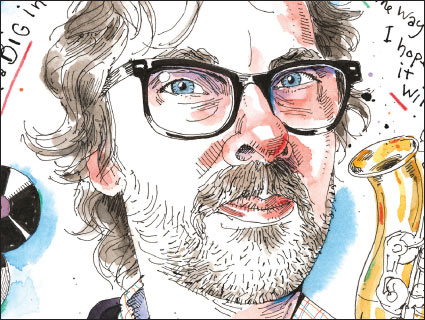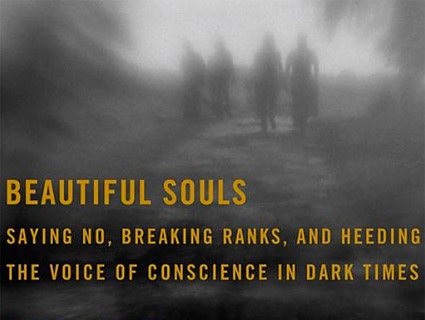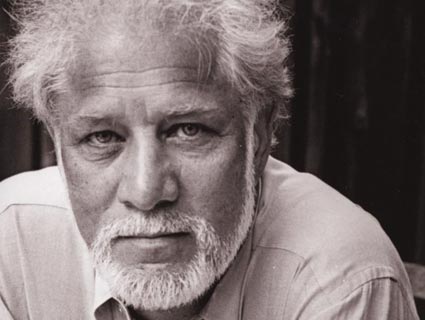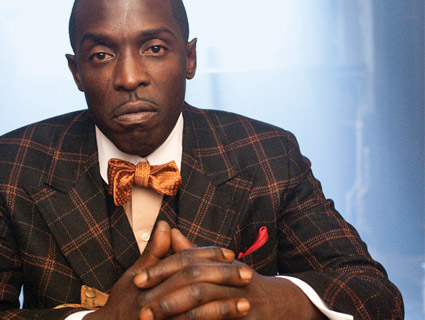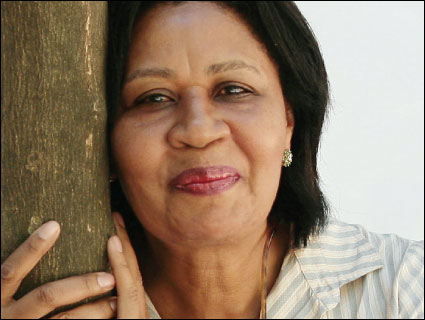
Cosima Scavolini / La Presse / ZUMAPRESS
Jamaica Kincaid’s office at Claremont-McKenna college, where she is a literature professor, is filled with hints of her political leanings. There’s an Obama mug, a statuette of the Lincoln memorial, and—”just for provocation,” she insists—a miniature bust of Karl Marx. When I showed up to interview her a few weeks before the election, and the topic inevitably arose, Kincaid paused abruptly and looked down at her outfit in mock horror. “I’m not wearing my Obama T-shirt!” she exclaimed. “I rushed out of the house! This is serious—it’s a talisman. I wear it every day.”
Her political sensibilities are not surprising, given the prominence of class and race in her work, not to mention her personal history. Born Elaine Potter Richardson in colonial Antigua, Kincaid came to the United States at 16, sent by her cash-strapped family to work as an au pair in Scarsdale, the tony New York City suburb. By 25, Kincaid had landed a staff writer job at The New Yorker, where she would remain for 20 years. Now 63, she has churned out a dozen books—including Annie John, Mr. Potter, and Autobiography of My Mother—hauled in countless awards, and, to top it off, has stayed startlingly hip: She’s hooked on Game of Thrones and Homeland, and when her cellphone goes off, the ringtone is Jay-Z and Kanye’s “Ni**as in Paris.”
Out next week, her new book, See Now Then, reveals just how current she really is. Her first novel in nearly a decade, it is very loosely based on the dissolution of her marriage to composer Allen Shawn (son of William, former editor of The New Yorker.) It’s a stark, modern anatomy of married life that packs in everything from a cross-dressing neighbor to a Nintendo-junkie son. In our wide-ranging chat, Kincaid talked about her motherly shortcomings, converting to Judaism, and her brief career singing backup for a celebrity drag queen.
Mother Jones: There are conflicting reports on the internet as to why you changed your name when you began writing.
Jamaica Kincaid: Oh God. The internet! It was because I was writing about my family, my mother especially, and I didn’t want her to know. I also thought that I would fail at it. I’ve always been afraid of her knowing of my failures.
MJ: Why Jamaica?
JK: It was just sort of stylish. It was a time in my life when I was especially interested in frivolities. I used to have very short hair that I bleached blonde, and shaved off my eyebrows and painted them in, and wore clothes from the ’20s or ’30s. I was sort of a character. I would spend hours getting dressed and then I would go to the offices of The New Yorker—I was just beginning to be a “Talk” reporter—and hang out with my friends Ian Frazier and George Trow. And then we’d go and have drinks somewhere. But it was just sort of a display. There are all sorts of pictures. I’m surprised they’re not on the internet—thank God. To show you how silly I was: I was a backup singer for a transvestite named Holly Woodlawn—she was one of Andy Warhol’s superstars. I used to want to be a backup singer. Not a lead singer, because I really can’t sing.
MJ: So what moved you to become a writer?
JK: Everyone who knew me as a child, they say they’re not surprised that I became a writer because I wrote all the time. I don’t remember writing, because I wouldn’t have had the tools, but I think what they are saying is that I would pretend I was a writer. I loved to read, and I would pretend I wrote the books I was reading. I went through a period of pretending I was Charlotte Bronte after I read Jane Eyre, when I was 10.
MJ: How did you pretend?
JK: The author bio said that she had lived in Belgium as a nanny, and she was very poor and she suffered. So in the hot climate of Antigua, I’d pile on things and pretend I was cold and I was all alone in Belgium and I had written Jane Eyre and no one read it. And my life sort of mimicked that: I ended up in a cold climate as a writer, poor, and a nanny!
MJ: How did you survive in New York when you were starting out?
JK: I stayed on my friends’ couches. They would throw me out. Before I was a writer, I was a receptionist. I tried to get jobs in magazines and I never got them because I couldn’t really type very well, and also they didn’t really hire young black women. But I didn’t really understand that. I didn’t really understand racism because I grew up in an all-black society, so I didn’t see how it was possible not to like me! [Laughs.] I didn’t do anything illicit, or I would tell you about it.
MJ: But if you did have a vice, what would it be?
JK: LSD! Oh definitely.
MJ: How did you meet George Trow, the New Yorker editor?
JK: I met National Lampoon editor Michael O’Donoghue in an elevator. We started to talk, and he said, “I know someone who would like you very much!” And he introduced me to George, who adopted me as a sister. He thought I was funny, so he would take me to events with him, and I would say something, and he would write it down. And the things I said began to appear in “Talk of the Town”; George would say “we went somewhere with our sassy black friend Jamaica Kincaid” and the whole rest of it would be something I had said. [Laughs.] And one day he said, “Would you like to meet [editor-in-chief] Mr. Shawn?” I had no idea who Mr. Shawn was, so I said yes! Mr. Shawn said I could write for the magazine. I wrote something, and I thought they were just my notes and little thoughts. George gave them to Mr. Shawn, and Mr. Shawn published them just as I had written them down. And that was how I started.
MJ: “Sassy black friend”? Did that bother you?
JK: Not at all! I grew up very strict—sort of a black, colonial version of a suppressed English person. So the idea that I was funny and sassy and black! And I’d always wanted to be an African American, along with being a writer, when I was growing up. I love black American style. I used to try to make my hair look like someone in Ebony magazine.
MJ: Do you like hip-hop?
JK: I love hip-hop. You know when Kanye West was releasing a song a week, every Friday? My son would send me the release, because he and I like that. But when rap started, you know when Mrs. Gore and that other senator’s wife were talking about the lyrics of rap music? She was very outraged by rap, and a lot of parents were—I never had that problem.
MJ: Even with the misogynistic stuff?
JK: I’m not going to defend misogyny in hip-hop. But it didn’t affect me the way, say, Hustler magazine did. It’s very funny, American society: White culture can do all sorts of things and get away with it, but the minute a black person does it, it’s interpreted in some way.
MJ: In your own writing, female characters find strength in their femininity—in their own bodies, and in sex.
JK: You know how they say a man’s house is his castle? I think for a woman, it’s her body. I feel so strongly about a woman’s right to choose. This is my Zionism. It’s not a “right” any more than it’s a right to breathe, to take in oxygen. I think a woman is powerless if she cannot freely claim the right to her reproductive capacity. Society can talk about anything it likes, except a woman’s reproductive existence. I think I write out of that feeling.
MJ: I understand that you converted to Judaism. How come?
JK: Oh, I don’t talk about it too much. I married a man who was Jewish, and we had children. I thought that bringing them up with knowledge of Jewish tradition would make their lives more complete.
MJ: Were you religious or spiritual before?
JK: Yes! I was brought up a Wesleyan Methodist. And I have actually read the entire Bible. But I never liked the New Testament. It’s very personality-driven. Like an early version of People. It’s just all: “And then he said to me. And then he said to you. And then he did this! And I liked him. He liked me best. He was closer. And we were best friends. And this is where we met.” I never liked it!
MJ: So the Sweets, the couple in See Now Then, are based on you and your ex-husband. Right?
JK: [Laughs uproariously.]
MJ: I mean, I know it’s not autobiographical, but…
JK: Oh, I should have changed…yes, it does bear some professional resemblance, yes. You know, you write these things in the middle of the night in the prose of your own thoughts and you forget that it will have a meaning. Everything I write is autobiographical, but none of it is true in the sense of a court of law—you know, a lie is just a lie. The truth, on the other hand, is complicated. It is true that I am a writer, and I was married to a composer, and I have lived in a small village in New England, but my children are not named Heracles and Persephone, and my daughter doesn’t disappear underground every six months and emerge in the spring.
MJ: Well, were you writing from a place of thinking about the split of your own union?
JK: I suppose I was. I think I was trying to understand how, short of an accident—you know, you pick up the phone, he says, “Your mother is dead. Her car. The Earth fell”—I never expected the everyday to suddenly become an accident. Suddenly you go downstairs and the pine floor is a gravel pit. I was trying to understand how the everyday suddenly becomes the unexpected.
MJ: Are you nervous about your ex seeing the book?
JK: Nope. [Laughs.] Not at all. Gosh, until you brought it up it never occurred to me that it is about anybody. My mother always told me she never read anything I wrote, which was marvelous because it meant I could write about her as much as I liked. And my children don’t have any interest. I’ve always been glad that they never saw me as a writer. I think children don’t see their parents as accomplished; they just think, “Oh, there’s Mom.”
MJ: Heracles and Persephone resent their mom for spending so much time writing.
JK: Yeah, you know, I was thinking that at one point the children said to me, “You were always late picking us up at the bus.” They remember me disappearing and writing a lot. Whereas I remember it as, you know, not having enough time—the room I wrote in was off the kitchen because even though they had a nanny, I liked knowing what was going on with them and I didn’t want to close myself off. I remember once reading something Nora Ephron said: that anything that’s good for you is bad for your children. I never forgot that. I think my children in some ways felt that my success interfered with their complete happiness, and I think a lot of mothers feel that way. But that’s just the way it is. There’s nothing to say about “having it all,” or women should have this—life is difficult.
MJ: So…you’re known for having windy syntax. There’s a sentence in the new book that’s two pages long…
JK: Oh, that’s marvelous! I hope it changed points of view in the sentence. Yes, yes, I am famous for that.
MJ: Do you worry it might turn off your readers?
JK: I could never write with a reader in mind. I tell my students that all the time. If I want to do anything with people in mind, I would become Mitt Romney, my favorite person to say mean things about. What’s the point of doing something like this—writing, or making something—if you’re going to have people in mind?

